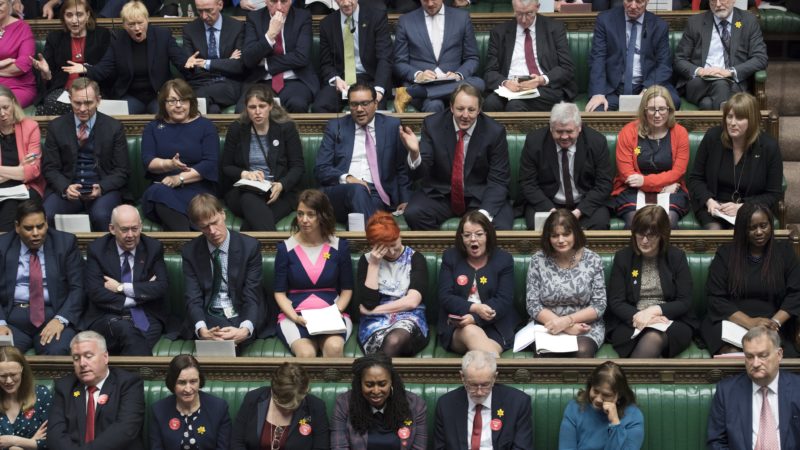
Parliament’s prorogation last night was the climax of a long, chaotic week in British politics. Since the return of MPs from summer recess, we have been transfixed by the government’s manoeuvres to suspend parliament and push through a no deal Brexit that it does not have the votes for, and by MPs’ counter-measures, culminating in the ‘Rebel Alliance’ seizing control of the order paper yet again to pass the Benn Bill.
The legislation by Hilary Benn, which forces Boris Johnson to ask the EU for another Article 50 extension, clearly unleashed the anger of Dominic Cummings. The notorious Vote Leave strategist, now in 10 Downing Street, was supposedly instrumental in the decision to remove the whip from 21 Conservative MPs who voted for the Benn Bill. The government is unable to command a majority in the House of Commons and the Fixed-Term Parliaments Act is trapping the Prime Minister in this situation, as the opposition refuses to vote for an election before a no deal exit is securely avoided.
Parliamentary democracy seems broken. The mammoth task of delivering the result of the 2016 referendum is tearing Britain apart. We are witnessing the disintegration of the Conservative Party, to re-emerge as something that might be more socially reactionary, more authoritarian and more populist than what we have known so far. Society, too, feels more divided than ever: tensions ran high last weekend as far-right groups gathered in central London at the same time as Remain protesters held rallies along Downing Street, calling on Johnson to “stop the coup”.
What has become clear from recent events is that trust in our system of governance has been fundamentally eroded on all sides. On one hand, Leave voters might query why it takes so long to implement the Brexit vote. After all, the question on the ballot paper was a simple “yes” or “no” to whether we should leave the EU.
On the other hand, there are those who are newly politicised by Brexit. Often described as more middle-class and liberal in their politics, these people never took to the streets before. Yet during the “Stop the Coup” protest week, we saw EU beret-wearers, office workers in their suits and left-wingers carrying “open borders” placards march alongside each other towards No10 to shout their anger at the government into the night. These people have, perhaps for the first time, felt what many of those affected by the government’s cruel policies and austerity already knew to be true – that those in power do not work for you.
It is hard to imagine a world where we can just go back to how things were before, regardless of what happens with Brexit at the end of October. Instead, this moment of rupture must be grasped as an opportunity for those on the left who believe that a truly equal society can only emerge if we fundamentally change the structures of the British state as it exists today.
Let’s take, for example, the Queen. The constitutional monarch as the head of state removes an important layer of checks and balances from the democratic system. Whereas in other countries, the head of state’s role is understood as a “neutral referee” who might be able to step in if a new law is a breach of fundamental rights, the Queen’s role is to nod through whatever the Prime Minister puts to her.
The monarch is not even supposed to give any opinion on what is happening in politics, pretending that a Queen or King is an impartial, non-political actor. In reality, nothing about the monarchy as a system of governance is apolitical. After all, what could be more counter-intuitive to socialism than a political system based on inherited power and wealth?
As politics becomes more fragmented, it is also clear that first-past-the-post does not serve its intended purpose. Britain is no longer a two-party system, and it appears increasingly impossible for a single party to deliver a stable, healthy governing majority. Perhaps it is time to consider moving away from the old conventions and giving proportional representation a go.
The Brexit vote was driven by a feeling of powerlessness. That is why the “take back control” slogan resonated so deeply. But instead of tying empowerment of the people to leaving the EU, particularly under the terms of this government and with the consequences of a no-deal Brexit looming, the left should seize this moment to shift the narrative towards constitutional reform.
Perhaps if Britain got its house in order – moving away from a highly centralised political system where regions and nations feel left behind, suffer from under-investment in infrastructure and lack of a political voice – then maybe the country could have a fresh start. If we removed a political class of landowners, aristocrats and wealthy elites from our democratic structures, maybe the people could truly take back control of their lives.
To be successful, a new constitutional settlement must be developed in an open, democratic way, with citizens’ engagement at its heart from the start. Labour should investigate how this could be facilitated, taking inspiration from citizens’ assemblies and workers’ councils.
From these new foundations, we could build a different society – one shaped by its people. We can transform the economy and ownership, deliver public services and give those a voice who feel they’re being drowned out by the elites. This is an urgent task. As the famous Antonio Gramsci quote goes: “The old world is dying and the new world struggles to be born.” The left cannot leave this vacuum open for the far right, populists and authoritarians to exploit. That truly would be the time of monsters.




More from LabourList
‘Labour is being badly misled on housing’
Reeves bets on patience over populism
‘Energy efficiency changes must work for older private renters’